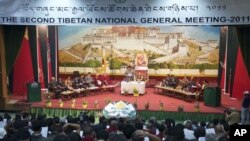Exiled Tibetans are gathering in northern India to address the issues regarding proposed amendments to the current Tibetan charter as laid out by the Charter Amendment Drafting Committee after the Dalai Lama's denoucement of his political power.
More than 400 delegates from around the world have traveled to the four-day conference in Dharamsala to deliberate changes to the charter pertaining to the Dalai Lama's new position and his executive power in the current exile Tibetan Administration.
The Dalai Lama announced earlier this year he wanted to relinquish his political power, saying it was time for Tibetans to give that role to an elected official.
The 75-year-old said he would still serve as Tibet's spiritual leader.
Most of the political power will soon rest with newly elected Prime Minister Lobsang Sangay. Speaking at the conference, Sangay said delegates could still convey the ``people's desire'' for the Dalai Lama to maintain some political role.
Earlier this month, Sangay said he would continue to pursue the Dalai Lama's "middle path" policy which calls for Tibet to have regional autonomy under Chinese rule.
He also said he is ready to talk with China "anytime, anywhere."
The Harvard University legal scholar takes up his office in August in the Indian city of Dharamsala.
The government in exile has held nine rounds of talks with the Beijing government, but has made no progress toward reaching an agreement with China.
Many Tibetans say China discriminates against them and wants to suppress their cultural and religious traditions. China denies that and says its policies have helped bring new prosperity to the impoverished region.
On Thursday, China's top Tibetan official said the Dalai Lama is welcome to return from exile, as long as he gives up aspirations for Tibetan independence.
The Dalai Lama fled Tibet in 1959 after a failed uprising against Chinese rule. He says he is not seekign independence for Tibet, just greater autonomy. China considers him a separatist.





